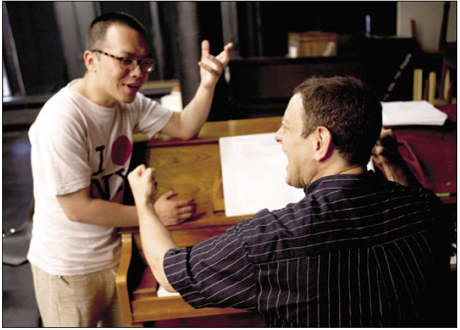US
Chinese flair, queens and magic to hit the stage
By Kelly Chung Dawson (China Daily)
Updated: 2010-07-22 21:01
 |
Large Medium Small |
|
 The Joker's Game writer Kemin Zhang (left) and musical producer Tony Stimac. Kyle Bastien / For China Daily |
A Western-style Chinese musical is being developed by enthusiasts in New York
NEW YORK - Musical theater has traditionally been the provenance of Western culture, but with a production titled The Joker's Game, a trio of enthusiasts aims to capitalize on China's growing population of art sophisticates.
"We're trying to create the original Chinese musical," said author Kemin Zhang, "set in China, about Chinese people, in the Chinese language."
Still in development but slated to open later this year in China, The Joker's Game is about J.J., a magician who faces dueling forces in the form of four "Queens": power, wealth, fame and a love interest labeled the Queen of Hearts, naturally.
The production takes playful, pointed stabs at China's flagrant materialism and what Zhang, a Canadian-raised Chinese native, believes to be the smoke and mirrors of modern life in China.
"It's such a fast-developing world there now, and everything can be an illusion," Zhang said after a staged reading of an English version of the production in New York.
"If you play by the rules of the Western world, you might just get caught up in someone else's game.
"We look to the magicians as the ones who provide deceptions, but they do it for entertainment - and that's not always the case when people are in it for money, fame or power.
"I feel that with this production we're in the position to tell a story about illusions, as China enters a new paradigm."
Interwoven with music written by New York composer Mark Allen, the play - which the producers hope will open on Broadway after its Chinese debut - presents a humorous take on priorities in an upwardly mobile society.
The Queen of Spades, depicted in the character of theater manager Madame Wang, would rather J.J. die in a show-stopping finale that would reap both fame and insurance money, than see her daughter happily wed to him.
A group of four aspiring female entertainers, calling themselves "The Hot Hot Girls", sing about catching a break, and various characters including manager Tia Ling, the Queen of Diamonds, evoke the sanctity of labels such as Prada, Gucci and Dior.
Later Madame Wang sings one of the production's catchiest numbers, You've Got to Do a Little Business (To Get a Little Business Done), in an unmistakable nod to China's unofficial favor-trading tradition of business guan xi.
Zhang himself experienced some of the illusions detailed in A Joker's Game, when a foray into a magic show on CCTV, China's national TV broadcaster, briefly brought fame and fortune in 2004.
"I quickly saw through the spectacle and decided it wasn't as interesting as pursuing what you really love," Zhang said.
"When you study magic you get in the habit of seeing things from two perspectives: the effect, and the truth that lies behind it."
Tony Stimac, a veteran theater hand who with lyricist James Racheff is writing and producing the musical, believes that Broadway-style theater is due for success in China.
"There are so many stories from China's recent history, it's mind boggling," Stimac said. "The more I hear and see, the more my mouth just falls open.
"As China becomes more known to the world, if Chinese people don't tell China's stories other people will.
Just like France has 'Notre Dame', I got involved thinking, 'There's an opportunity here to make history'."
Despite a tradition of Chinese opera and the success of Broadway shows that have toured Asia, China has never developed a homegrown appreciation of musical theater, Stimac said.
Broadway-style theater originally flourished in the US after World War II, during a time in which the national mood was one of power and optimism, he said.
"Musical theater tells stories that uplift the human spirit, and I think China is now in that same period," Stimac said.
"There's enthusiasm in the air and there's a spirit that's entrepreneurial."
Zhang believes China is an emerging market for these kinds of productions. "People are becoming more sophisticated and theatre is the next trend," he said.
"Musical theatre would be a natural next step for the nouve riche to adopt."
In fact, Rent and Mama Mia are two Broadway plays that are being localized for Chinese audiences.
Several universities in Beijing, including the Central Academy of Drama, Tsinghua University and Beijing University, now offer musical theater courses, and Stimac has seen fervent enthusiasm in the younger generation of drama students, he said.
"Once we start doing shows in Chinese, I have no doubt China will become a center for musical production," Stimac said.
"I think musical theater is an art form whose time has come, in a country that's in a position to do something about it."
China Daily